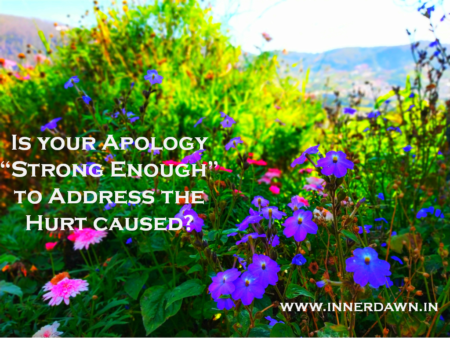Is your apology strong enough?
If you had done something deliberately or inadvertently that had hurt the other person, and you value the person or the relationship then you tend to apologize. What really constitutes this apology? What makes an effective apology?
Is your apology as strong as the hurt that your actions have caused to the other person? Lets explore this tricky but essential aspect of relationships.
How would you know if your apology is adequate enough or effective enough to redress the hurt caused in the other person?
First of all the question to ask yourself is – do you understand what is the extent of hurt caused in the other person with respect to your words, actions or inaction?
If your answer is I don’t know and it doesn’t matter, then don’t even bother to apologize, cause your apology doesn’t mean anything. If how the other person feels doesn’t matter to you then the relationship also doesn’t really matter to you.
If you don’t know, ask the other person, talk to them. Have a conversation with an intent to understand. They may blame you or accuse you in the moment, but be patient to understand their point of view. Empathize with them. Do not defend or justify your actions. Then it’s not an apology.
The apology that you offer needs to be commensurate to the hurt or pain caused by your actions. Unless you truly and genuinely understand this you may end up offering an apology with respect to your own understanding rather than the reality of the other person. This may not be adequate enough to address the issue and the hurt caused.
Did you insult the other person? Did you do it in front of others?
Did the person feel disrespected by you? Were they ashamed that they were insulted or put down in front of others? Given them a chance to tell you how they felt about it, even vent about it. Take responsibility for your actions. If you insulted or put down the other person in front of others, then was your apology also offered in front of others?
Did you act or not take any action or offer adequate support to someone in trouble?
Are you aware how it affected the other person? Did they feel neglected, taken for granted or felt indifference towards them? The question to ask would be what are you trying to achieve by the apology? Ask yourself if it is a half-hearted attempt or are you willing to take responsibility for your words, action or inaction.

Acknowledge what you did or didn’t do.
Taking responsibility for your actions or inactions is a key aspect. Express to the other person that you accept responsibility for your behaviour. Express how you feel about it, express remorse if you feel so genuinely.
How are you going to make up for it?
Yes it is true that you cannot take away the pain that was already endured. You cannot remove the hurt or shame that was felt. There is no time machine to go back into the past and undo what was done. A genuine, heartfelt apology or an acknowledgement is what you can offer, with a promise to learn from it, not to repeat it again and to look at how you are going to make up for it.
What are you willing to do about similar situations in future?
A true apology is about taking responsibility for your actions or inactions, understanding the impact on it on the other person, feeling contrite – feeling or expressing remorse at the recognition that one has done wrong and a resolution to not repeat the same again or act in a more considerate manner in future. Apologizing for something and repeating the same again in future erodes the quality of the relationship.
A genuine apology mends and heals the damage to the relationship. If it is not genuine, then it creates even more damage to both the individuals and the relationship. An apology without a real change is just manipulation.
About the Author:
Kala Balasubramanian is a certified Counselling Psychologist and Psychotherapist with a Masters in Counselling and Psychotherapy, Diplomas in Counselling and has further certifications specializing in couple/marriage/relationship counselling and family counselling. As a trained therapist, she provides professional and confidential – face to face Counselling in Bangalore including Individual counselling and Couples counselling / Marriage counselling in Bangalore and Online Counselling over video calls for others residing outside Bangalore and abroad.
Reach us at +919632146316 or write to us at counselor@innerdawn.in. If in Bangalore, you can meet the counselor in person – face to face. If you are in a different location you can ask for online counselling over video calls.

